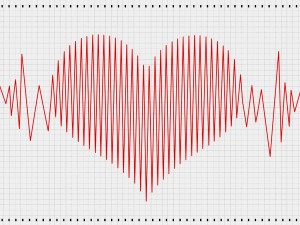Best Ways to be Heart Smart
 It’s been a long day at the office. Too tired to cook, you pick up something from the Golden Arches on the way home, maybe light a cigarette or, even if you eschew tobacco, pop into an armchair for an evening of decompression in front of the television. Seems harmless, right? As the days spent cutting corners add up, you may be putting yourself at an increased risk for heart disease.
It’s been a long day at the office. Too tired to cook, you pick up something from the Golden Arches on the way home, maybe light a cigarette or, even if you eschew tobacco, pop into an armchair for an evening of decompression in front of the television. Seems harmless, right? As the days spent cutting corners add up, you may be putting yourself at an increased risk for heart disease.
“What you see on the news is that people are not as active as they should be, not eating as well, and smoking, and that affects their overall health,” says Chris Spencer, nurse practitioner and director of community health services for the Tahoe Forest Health System. Bad habits lead to bad health: Most people just don’t pay attention to the signs.
“It’s hard to get to people,” says Spencer. “The biggest risk factor in heart disease is denial, because people don’t [physically] feel sick.”
Know your numbers
According to Dr. Michael Bloch, medical director of St. Mary’s Risk Reduction Center in Reno, heart disease is usually identifiable before problems arise. “Family history, smoking, high sugars, abnormal cholesterol, abnormal or high blood pressure, being overweight, sedentary lifestyle: all are very predictive of risk,” he says. “One of the big things is to know your numbers. In order to decrease risk, first you need to know what your risk is.”
Though all risk factors should be taken seriously, blood pressure and cholesterol can sneak up on a person.
“They’re what we call the silent killers,” says Bloch. “There’s no way to know that you have high blood pressure or poor cholesterol numbers unless you get them measured.” While medical tests can be expensive, there are affordable alternatives such as South Lake Tahoe’s Barton Health, which offers “Health Fair Labs” for $55. “This is a good place to start and includes a complete blood count, a chemistry panel that will look at glucose, liver and kidney function,” says Barton physician Dr. Paula Crenshaw. “Lipids are also included to look at cholesterol and triglycerides.”
From there, Crenshaw may order more specific tests, such as a VAP test, which checks lipids to help determine if a cholesterol problem is hereditary. “Not all cholesterol problems can be dealt with by diet changes. Many are genetic and not correctable without medication,” she says. She notes, however, that medication is not a substitute for healthy food and habits.
Low-risk patients should get an initial screening in young adulthood, regular screening after age 40 and annual screening above age 50. However, says Crenshaw, with obesity on the rise, physicians recommend screening obese children and those with high-risk parents for diabetes and cholesterol disorders.
Lifestyle modification
Physicians strive to find and treat risks before they lead to more serious problems. When that fails, doctors rely on secondary prevention, or prevention after an initial heart attack or stroke.
“The real work begins when the patient leaves the hospital,” says Dr. David Young, cardiologist for Sierra Nevada Cardiology Associates at Reno’s Renown. “Lifestyle modification is one of the most important things we as cardiologists can instill in people.”
Smoking cigarettes is at the top of the list for heart-unhealthy living. Not only do cancer sticks effectively triple a person’s risk for heart disease, but Young says the actual chemical process causes blockages in arteries.
If you’re a smoker, don’t despair.
“One of the nice things about cardiovascular risk is that it begins to come down very quickly once somebody quits smoking,” says Bloch.
Diet is another aspect of a heart-healthy lifestyle. Young recommends the modified Mediterranean diet, which avoids solid fats and red meat and encourages whole grains, leafy vegetables and the use of olive oil in cooking. Tahoe Forest Health’s Spencer suggests dividing your usual amount of food into six meals a day, eaten at two to three-hour intervals. “People find they’ll actually lose some weight because their body is burning the calories rather than storing the fat.”
And there’s no need to fret if exercise feels like too far a stretch. “Exercise doesn’t have to be a four letter word—it can be accumulated in three ten-minute sessions a day rather than all at once,” says Spencer. In small doses, it’s not so overwhelming.
For folks in the Tahoe region, Crenshaw encourages looking no further than out the door. “There are so many outdoor activities to do here, I often say run until the day you fall into the grave. Exercise is the fountain of youth.”
Help is on the way
Tahoe Forest Hospital’s Heart-to-Heart speaker series, which is free and open to the public, features cardiologists, dieticians, cardiac rehabilitation nurses and exercise physiologists who speak on subjects including medication tips, fitness plans, stress management, heart healthy recipes, even what to do in case of chest pain.
St. Mary’s Health and Fitness facility employs health coaches who can put together diet and fitness regimens for those at risk or in rehabilitation; the hospital’s Risk Reduction Center also works with patients one-on-one, whether for primary or secondary prevention.
Renown’s cardiac rehabilitation program includes supervised exercise, heart monitoring and nutritionists, all key to recovery. “Exercise is very beneficial in reducing cardiovascular risk,” Young says. “It improves cholesterol, reduces blood sugar and blood pressure, and helps [patients’] mood. A lot of people who have cardiovascular disease can get depressed. Exercise keeps them mentally on top so they can improve their health without having to take eight pills every morning.”
“Good health is dependent on four things: exercise, diet, genetics and luck,” says Crenshaw. “So exercise: Run for your life. Eat healthy: close to the earth and have a colorful diet of lots of fruits and veggies. Don’t ignore your family history: If Dad died young, don’t assume you didn’t inherit something. And the rest is luck. Enjoy life, don’t live in fear.” By Jen Schmidt. TQ
Category: Best of Tahoe 2011






